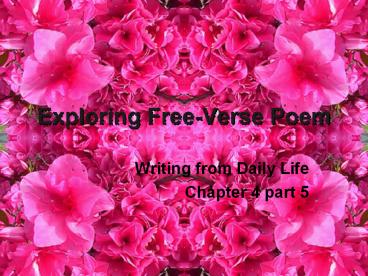Exploring Free-Verse Poem Writing from Daily Life Chapter PowerPoint PPT Presentation
1 / 13
Title: Exploring Free-Verse Poem Writing from Daily Life Chapter
1
Exploring Free-Verse Poem
- Writing from Daily Life
- Chapter 4 part 5
2
Poetry Forms
- Short lines arranged in stanzas or graphic
relationships single poetry to the reader. - Sometimes the shape of the line arrangement is
important - Concrete poetry the shape of the poem represents
the meaning - More strict forms of poetry have required line
lengths, syllable counts, words that end or begin
lines, rhyme schemes - Sonnets
- Sestinas
3
Free-Verse Definition
- Verse composed of variable, usually unrhymed
lines having no fixed metrical pattern - The form used by most contemporary poets
- The poet comes up with the pattern that fits the
poem and creates meaning
4
Free-Verse Decisions
- Stanzas
- Both sample poems use one stanza to intensify the
moment and the meaning - Multiple stanza poems each stanza should have a
connection or a theme - Line Length
- Sotos lines are 4 9 words in length with the
average being 6 words - Oliver uses 3 11 words in length
- Each line should have its own image or area of
focus - Do not let individual lines get too long. They
can confuse the reader
5
Free-Verse Decisions
- Ending/Beginning of Lines
- End and begin lines with strong words
- Soto uses one syllable words to end his line
emphasizing the age of the boy and the fame he
wanted to achieve - Oliver uses two syllable words to end the lines
to create a conversational tone - Breaking the pattern of line endings/ beginnings
will emphasize areas of the poem
6
Forms
- Free Verse is without rhyme or pattern and has
lines in varied lengths. - Fixed Forms are poems with predefined patterns
and line lengths. They can include rhyme schemes - Haiku
- Limerick
- Fixed forms give poets specific requirements for
the poem - Sonnet is a 14 line lyrical poem containing
specific rhyme schemes and a single emotion or
theme - Some poets prefer the contraints with Fixed Form
poetry because the forms lead them to new
discoveries.
7
Revising to Create a Free-Verse Poem
- The number of stanzas and line breaks are the
poets choice in free-verse - Although I have set some requirements 3
stanzas and 30 lines - The poet must decide a pattern that will create
the meaning - Revising is a way to create the free-verse poem
that will reshape both the poem and the meaning - Flexibility is the key to successful revision.
Be open to change.
8
Writers Practice 4.5
- First two questions
- 1 Take those sentences and using EVERY word,
break it into a free verse poem. - Pay attention to line length, ending / beginning
words and stanzas. - 2 Answer the question and explain your answer.
- Once you have done that, then move to the Write
in Your Journal section
9
Write in Your Journal
- Do not skip either the WIJ or the two questions.
Doing so will GREATLY reduce your grade for this
assignment.
10
Writers Practice 4.5
- Minimum of 30 lines and 3 stanzas
- Decide on stanza and line breaks to create a
pattern - Break that pattern occasionally to create
emphasis - Determine a line length, then make one line
shorter or longer for emphasis - Emphasize words by placing them at the beginning
or ending of lines
11
Writers Practice 4.5
- Conclude the lines with single-syllable words,
use mainly nouns and verbs - Vary the words at the beginning of the lines.
- The first word is just as important as the last
- Create a surprise by breaking a phrase, placing
half on one line and half on the next line - Create a pattern, then break it to add emphasis
12
Writers Practice 4.5
- As you work, you may find that working with
stanzas and line breaks help you find what
details to cut or add - The best place for stanza and line changes are on
the computer - You can easily change and change back if needed
- Spend a lot of time doing this until you find one
that you like. - You are creating meaning and emphasis by doing
this. Although the reader will not usually
notice these decisions, you will shape the
meaning by deciding consciously how and where to
create emphasis.
13
Writers Practice 4.5
- Question 1 Form the sentences into a poem by
making line-break and stanza decisions. (It
better look somewhat different) - Question 2 Compare with pages 75-76. Did you
emphasize the same words? - Email these two answers to me
- Do Write in Your Journal
- MINIMUM OF 30 LINES

